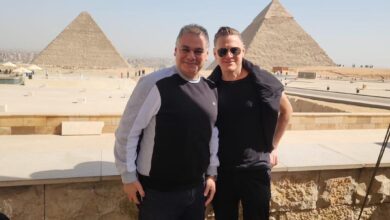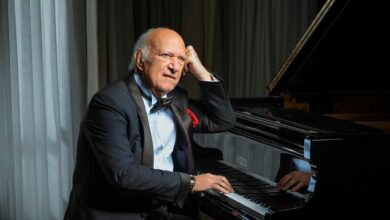You must have heard the song "I'm the one whose life is so wrong,” by shaabi DJ Amr Haha. The DJs, singers and growing fan base of this genre, that mixes electro, hip-hop, folk and Sufi music, are “Out of the Picture” according to Cairo's Genaina Theater. The management want to bring it into the picture and that’s why they are hosting two shaabi music concerts this month – the first last Thursday and the second tonight.
On Thursday, Amr Haha, Figo, Alaa Fifty, and Al-Sadat Rap performed. The first two have an ongoing creative war over who is the founder of the genre. While Haha first distributed the music on CD, Figo claims that he mentored Haha for years. The two are buddies though. Al-Sadat Rap said on Thursday, “Figo and Haha are brothers. We don’t want no more rumors.”
Genaina Theater director Ashraf Kenway still seemed concerned while presenting the DJs, as the street festivals and dance rituals associated with the genre are often accompanied by drug abuse and hysterical dancing in working class Cairene neighborhoods.
“Smoking is not allowed in the theater,” said Kenawy, before adding, "These young men present a music genre that deserves a chance to be listened to.”
The concerts were publicized as part of the theater’s search for “new meaning in music, music that reflects the political and social changes associated with the 25 January revolution, reflects the voices of the young, the poor, those often overlooked by mainstream media.”
To the management’s surprise, the shaabi music festival vibe turned out to be more popular than they expected. As soon as the artists began performing, Genaina’s relatively elite audience greeted them with euphoria, dancing and hysterical screaming Haha-style.
But some audience members criticized the theater’s decision to host the artists. They see these festivals as highlighting mediocre music with “dirty words” and dance moves associated with drug abuse.
The majority of the attendees loved it though. On the event’s Facebook page, Mohamed Yehia wrote: “Simply put, those who don’t like the music should not come to the concert. We had enough social isolation.”
The story of these music festivals began in the early 2000s with the proliferation of music mixers that spread from the confines of discos to street weddings and other special occasions. The rise of young shaabi DJs allowed communities to save money on singers and belly dancers, as they provide a complete performance.
Mohamed Beshir writes passionately about the genre on his blog Gemyhood: “Ambitious young people and affordable equipment gave the flagship to ‘wedding DJs’ to control youth gatherings in the popular areas … Put all your theories aside. All you have to do is save for the equipment and you’ll find a lot of work at the neighborhood weddings of families, neighbors and friends.”
Beshir adds that with the spread of technology and the increase in the number of young people working in the field, artists developed new ideas to have an edge over others working in the same neighborhood. This is how accompanying dancing groups emerged. Dances spread and each neighborhood developed its own dance routine to its songs. "These performances became part and parcel of the shaabi techno music festival,” he says.
The result is a local combination of techno music festivals with the lighting, smoke and sound effects, along with hip-hopish live performances and improvisation. DJs often starts off with a call on the neighborhood youth (good evening everyone), mixed with praise for manhood, honor, and an explanation of why the neighborhood as a whole, and the DJ in particular, are better than the rest.
Shaabi music was born and developed away from record companies and mainstream satellite TV channels. At the same time it brings back a ritual that disappeared with the spread of cassette culture, the shaabi neighborhood singer who knows the people and their stories and writes them in his lyrics and songs. This was the norm in Egypt before the establishment of the radio service in the 1920s and the spread of gramophone companies. A neighborhood singer would first become known in local celebrations, then would travel from town to town singing and developing his music to the tastes of his growing audience base.
The growing number of shaabi DJs is no longer satisfied to perform in shaabi weddings. Figo's band Al-Sallam Ghosts was the first to hold street festivals just for the purpose of young men coming together to sing, dance and smoke to the improvised tunes of shaabi techno music. Sallam City is a working class neighborhood in Cairo, to which many poor families were relocated after the 1992 earthquake, and local themes recur in the band's lyrics.
The festivals sometimes have titles like “Joy,” "Festival," "World Cup" or "DJ Music.” Figo and Al-Sallam Ghosts, Amr Haha, the star of Ain Shams neighborhood, “Wezza,” “Benzina” and Islam To’to’ are among the most popular shaabi DJs.
"All these names have become increasingly popular as their music remixes are shared through online social networks, transferring them from wedding music to the glocal,” writes Beshir.
Shaabi music is very similar to rap and hip hop in terms of its inception, and the songs are not free from populist views on social issues. Haha for instance tackles how security forces intimidate people in one of his songs, titled “Your ID, Punk!” His theatrical dance moves were in evidence on Thursday, expressive and Michael Jackson-esque.
Figo also played his famous track about the revolution, which mixes Omar Suleiman’s famous 11 February speech with a techno beat.
The Genaina Theater is hosting a concert on Saturday at 8:30. DJ Islam Chipsy will perform with drummers Khaled Mando and Islam To'to', as well as saga singer Ola, the star of Mansoura.




